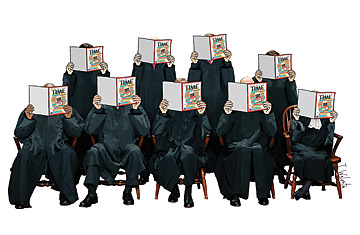
My day in Court. Who do you call when you need to interpret the Constitution? Me
I am deeply concerned about the American legal system. On Jan. 23, in U.S. v. Antoine Jones, Supreme Court Justice Samuel Alito cited me as a source in a concurring opinion. Our nation's interpretation of the Fourth Amendment--which, I'm pretty sure, is so called because it's the fourth best amendment--is now partly derived from an article I wrote about Internet privacy. An article that included two references to buying my wife $180 worth of lingerie.
My TIME cover story from last March, which heretofore had been cited only by me, was called "Everything About You Is Being Tracked--Get Over It." In it, I detailed how the personal information that companies gathered about me was harmless, thereby making the incisive legal argument that no one gives a crap. At the time, my article was largely ignored. But the Supreme Court disagrees with that assessment. And they're willing, if history is any guide, to send the National Guard into schools to back that up.
Having spent my early 20s considering going to law school, I am thrilled to have gotten all the legal recognition I could have dreamed of while limiting my work to watching parts of Legally Blonde on a plane without plugging in the headphones. To find out exactly how significant my contribution is, I called Jeffrey Toobin, a former editor of the Harvard Law Review and author of The Nine: Inside the Secret World of the Supreme Court. The conversation was incredibly awkward, since the Supreme Court has cited Toobin zero times. "This is a big deal," Toobin said. Law professors, he explained, are judged partly on the number of citations they get. And I was cited in what he said was a particularly important case, though I personally don't know how crucial it is that cocaine dealers remain free from having GPS devices attached to their cars in Maryland when the warrant was for Washington, D.C. But apparently this comes up all the time.
Most impressive, according to Toobin, they printed my name. "The fact that they actually got 'Stein' in there and not just 'TIME magazine' is a particular gesture of Alito's respect for your position in the journalistic and legal firmament," he said. Toobin was clearly suggesting that I call some law professors and rub Alito's particular gesture in their faces.
Michael Dorf, a constitutional-law professor at Cornell who clerked for Supreme Court Justice Anthony Kennedy, told me he's been cited five times but that my accomplishment was more impressive. "The Supreme Court cites about one piece of legal scholarship, on average, per case. My guess is that magazine and newspaper articles are substantially less frequent than that," he said. In addition to my writing, Justices have used Bob Dylan, William Shakespeare and Charles Dickens--each of us carefully picked for different reasons. "It could be that you write an article that is very controversial and widely regarded as stupid and gets cited a lot," he said. I got the feeling he felt like that was a bad thing.
